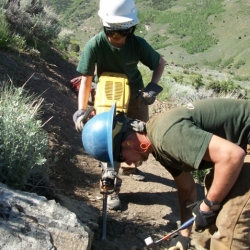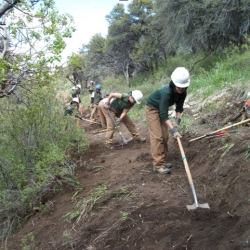Program of Study: Natural Resources Conservation
Country of Exchange: Nevada, United States
Tags: Co-OpEcologyFire ManagementRestoration
Where did you do your internship?
I worked for a non-profit organization called the Great Basin Institute (GBI) in the United States. GBI is an organization that promotes environmental research, education, and conservation through educational outreach and direct service. I was part of the organization’s International Conservation Volunteer Exchange program as an ecological restoration intern. I was introduced to this job through the UBC Forestry Co-op office. I was based out of Reno, Nevada but worked at sites located throughout northern Nevada. For example, I worked in the Lake Tahoe Basin Management unit, the Ruby Mountains, and also in the Sand Mountain region.
What did your job entail?
The position entailed a variety of work relating to ecological restoration. I participated in the construction and maintenance of trails while following USDA specifications and restored ecologically sensitive habitat degraded by off-highway vehicles (OHV) through the removal of illegal OHV trails. Additionally, I participated in a multi-year fuel reduction project through stand thinning with chainsaws. This was to encourage growth of a fire-resistant species following large scale clear-cut logging a century ago. I also mapped invasive weeds with a GPS unit along popular hiking trails. There was lots of camping and hiking everyday while on the job.
What was the highlight of your international experience?
The highlight was meeting people from all around the world who were also interested in conservation. It was an international program, so I got to meet, live, work, and travel with people of multiple nationalities. While we were working, the crew camped and lived together, so we all got to know each other fairly well. Also, because of the way the work schedule was set up, there were many opportunities for travel. We would travel and split up the costs so it was both economical and fun. I went to many well-known places, as well as places off the beaten track. The job itself was also a travel opportunity as we travelled all throughout the northern part of the state. It was a great experience for me.
Aspirations for the future
After graduation, I hope to work for an NGO, in a position that would allow me to travel to different parts of the world so I can gain more global experience. After I gain sufficient field experience, I hope to transition into policy work. I think that effective policies cannot be made without first-hand knowledge of what is occurring on the ground. Understanding is key to making effective policies.

